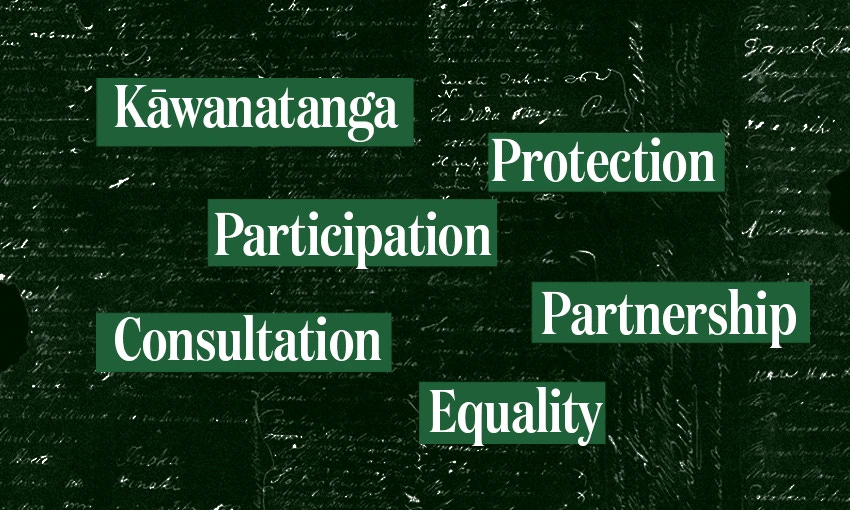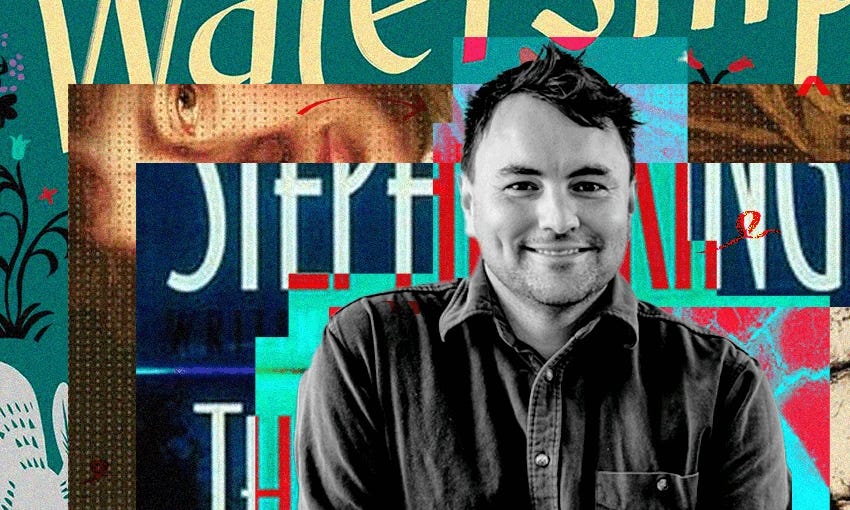Kia ora and welcome to The Weekend, the newsletter that showcases the best articles of the week from The Spinoff and around the internet. Lots of politics this week, and understandably so: while it’s a public holiday, Waitangi Day is a commemoration of some of most contested, and most important, parts of Aotearoa’s history, future — and present. We’re also down a Green leader (and up Chlöe Swarbrick’s contention), and ruminating about whether anyone in Wellington is willing to actually build more houses. In non-politics news, I plan to go for a long bike ride this weekend. Have a good one!
-Shanti Mathias, staff writer
So, what are the Treaty Principles? And how are they different from Te Tiriti?
As we approach 184 years since the first signing of Te Tiriti, the document is as alive and contested as it has ever been, with the Act Party’s Treaty Principles bill on the table. But what are the Treaty principles, and how are they different from the three articles of the document? This morning, Tommy de Silva has an explainer for anyone who is unclear. “The principles are ideas, phrases and words that are thought to capture the broad sentiments, intentions and goals of the Treaty to allow them to be incorporated into law and applied in practice”. Read it along with this piece by Carwyn Jones about what the Waitangi Tribunal can and can’t do, and what criteria must be fulfilled to have a treaty claim accepted. Jamie Tahana has also written a list of 10 memorable Waitangi Days from the past, with some excellent archival photos.
Want to learn more about Te Tiriti? Start with this reading, listening and watching guide.
In 2023, Spinoff readers funded some of our most beloved, well-read and impactful work. Help Me Hera, The Cost of Being, powerful longreads, Election 2023 coverage, laugh out loud satire, Wellington stories, Christchurch stories and everything in between was powered by Spinoff members and donors. If you did support us, thank you from all of us at The Spinoff. If helping fund well-crafted and insightful journalism is on your list for 2024, donate today or sign up to become a Spinoff member.
James Shaw - handing over to Chlöe Swarbrick?
This week, Green Party co-leader James Shaw announced his resignation. Chlöe Swarbrick was an obvious candidate to replace him: unsurprisingly, she announced that she’s running for co-leader. Toby Manhire has analysis this morning. “She has conviction, yes, but at the same time an increasing grasp of political stagecraft, an ability to motivate peers and build a squadron of volunteers, a knack for communicating compellingly in bars and in halls, on television and social media.”
Meanwhile, Shaw’s friend from across the aisle, Todd Muller, paid tribute to him. “James always had a flair for the pragmatic doable rather than endless debates about the potential perfect. But even so, he surprised me with his tilt for the leadership after just a few months as an MP. He grabbed a chance to articulate his view that political success for the Greens was not sitting in eternal opposition giving fiery speeches, but actually being in government and getting stuff done.”
Number of the week: 31 years old
Are you a 31-year-old Pisces with the kind of parents that might have volunteered you as an extra for a brand-new soap opera when you were a brand-new baby in 1992? If so, you might have been the baby that appeared in the first episode of Shortland Street. Alex Casey lays out the stakes: “Even in the very first episode of the long-running soap, a baby stole the show. With on-duty doctor Chris Warner unreachable due to a serious case of ‘shagging at the gym’ and a lack of birthing facilities on site, the responsibility for performing a risky emergency caesarian fell on new renegade doctor Hone Ropata who was firmly, as per the famous utterance, not in Guatemala anymore.” The show would love to feature the now-adult as an extra, and is looking for potential candidates to get in touch.
If you need to remember what even happens in Shortland Street, then great news: the entire first season is now on YouTube!
Tom Sainsbury reveals his reading history
Each week, The Spinoff Books Confessional is a delightful glimpse into someone interesting’s reading habits — and often, a reminder of how many books there are that you might never have heard of. This week, comedian and filmmaker Tom Sainsbury confesses that he has always been obsessed with dystopia. “I read a lot of nonfiction but fiction is where all the big ideas lie. When I think of all the books that have moved me, they’re novels. They deal with emotions and psychological insights that nonfiction can’t.”
Analysing the longlists for the Ockham New Zealand Book Awards 2024
The first fray in the War for Wellington?
This week, The Spinoff launched The War for Wellington, a series dedicated to the Wellington District Plan, which will decide the future of housing in the city for decades to come. As the plan process kicks off, a group of planners and architects appointed by the council released their report into which areas should be considered appropriate to densify on Wednesday. “They considered two questions: would making it easier to build more houses lead to more houses being built? And would an increase in housing supply help improve housing affordability?” Wellington editor Joel MacManus explains. “It might seem like a simple question for anyone who learned about supply and demand in NCEA level one economics, or even a toddler who has grasped the basic concepts of cause and effect. Not so much for the Independent Hearings Panel.” He questions their findings in this opinion piece.
Sign up to receive our weekly War for Wellington newsletter, written by the Spinoff's Wellington editor, Joel MacManus, and covering the latest in Wellington news.
Everything else
Singing in Pub Choir is the most wholesome fun you can have with a beer in your hand
“I’m disillusioned with work. Should I become a sex worker?” Hera has some advice, plus a recommendation of one of my favourite books 👀
How to discover your own taste in the age of algorithms
Will disgraced All Black Byron Kelleher be held accountable for his actions?
AI might make advertising more corrosoive and ubiquitous
Pedestrian shortcuts: a way to travel that feels like a secret
Meditations on exile, freedom and belonging from Phillip Matthews [paywalled] via River of Babylon
A devastating satellite visualisation of the up to 61% of houses in Gaza that have been destroyed
An argument for bringing back the “remarkable gift” of wearing a mask for yourself and others
“If we are to survive/the apocalypse we must/spoonify everything.” This week’s poem
I read this article about the rumours of a “lost tribe” of Māori in Fiordland a few weeks ago while sitting by the deep dark waters of Lake Te Anau, a perfect setting and a fascinating topic
Asbestos made cities much safer from fires, but is also deadly: on the mixed legacy of this natural material and the industry that removes it
A telling interview with TikTok CEO Shou Zi Chew about his perspective on the cultural power of the social media juggernaut
The Boy, the Queen and Everything in Between struts more than it stumbles

















